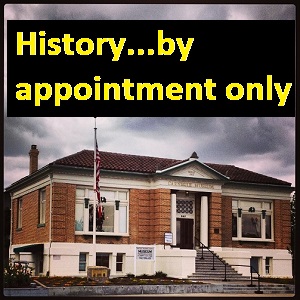
Previously public history books are now only available by appointment only at the Roseville Carnegie Library.
The Roseville Carnegie Library Museum operated by the Roseville Historical Society has become another elitist historical institution. Like other historical repositories of information, the once visitor friendly Roseville Carnegie Museum has placed their small collection of local history books off-limits to the casual reader. Now, if you want to thumb through a 1970’s era Roseville Telephone book, you need to make an appointment.
I became a member of the Roseville Historical Society back in 2014 when I was doing research on the California Central Railroad that ran from Folsom to Roseville. The Roseville Historical Society had their small collection of local and state history books on the top floor of the Carnegie Library Museum. I would spend hours reading through the books. This open book policy was in contrast to the Roseville Public Library that placed all their local history books behind a class wall and closed door. These books are so seemingly rare that only a trained librarian may assist the common man or woman doing a little research. (See a positive post I wrote: Roseville’s unique Carnegie Museum from 2013.)
When I walked into the Roseville Carnegie Museum at the end of April I was surprised to learn the book collection had been moved downstairs. Upon inquiring if I could look through some books, I was told that I would have to make an appointment because, “We just can’t have anyone looking at the books without supervision.” Seriously? Do they think someone is going to steal a 1960’s pamphlet on the history of Roseville by Duke Davis? And I hear the collection of 1970’s Roseville High School Yearbooks are in hot demand.
The Roseville Carnegie Museum operated by the Roseville Historical Society was unique in that it was not your typical elitist museum. Instead of casting suspicion upon anyone that was not a professional historian; the Roseville Carnegie Library Museum welcomed everyone to view their collections, no appointment necessary. But I guess that era has past and the Carnegie Museum would rather emulate larger stuffy institutions as opposed to sustaining the original mission of the Carnegie Library to make information available to all.
I completely understand the need to control access to irreplaceable books, memorabilia, and ephemera. That’s why we have museums to properly store, handle, and curate such objects. But when you place objects out of reach of the regular Joe, you are not preserving, you are hiding. Too many of these libraries and historical societies seem to operate for the exclusive use of their special members. Unless you have the time to make special appointments to see old books, those items remain hidden from view.
There are reams of historical books locked away by these little museums and libraries. I have no problem with safeguarding the items, but these organizations should make an effort to display the items for view on the Internet. Of course, they always whine about the expense and work of placing electronic images on the Internet. Another excuse is not being able to do it correctly because they don’t know how to work the software.
I’ve grown tired of these cliques of elitists hiding public information just because they believe they are the only people worthy to gaze upon the printed pages and appreciate the content. This is why I buy old railroad maps for the California State Railroad Museum, pay to have them converted into a digital format, and then post them on my website for anyone to view and download. Some museums and repositories of historical information are converting their collection into digital formats for public viewing.
Just because the Roseville Carnegie Museum is old doesn’t mean the operators have to maintain an old mindset. It is the irrational belief that the mouse trap doesn’t need improving that has doomed so many companies and organizations into obsolescence. The Roseville Historical Society may be on that road. Instead of embracing greater openness, they are shrinking the public’s access to historical information. This translates into potentially lower visitor counts and ultimately fewer members. Well, I know of at least one less visitor in the next year – me.